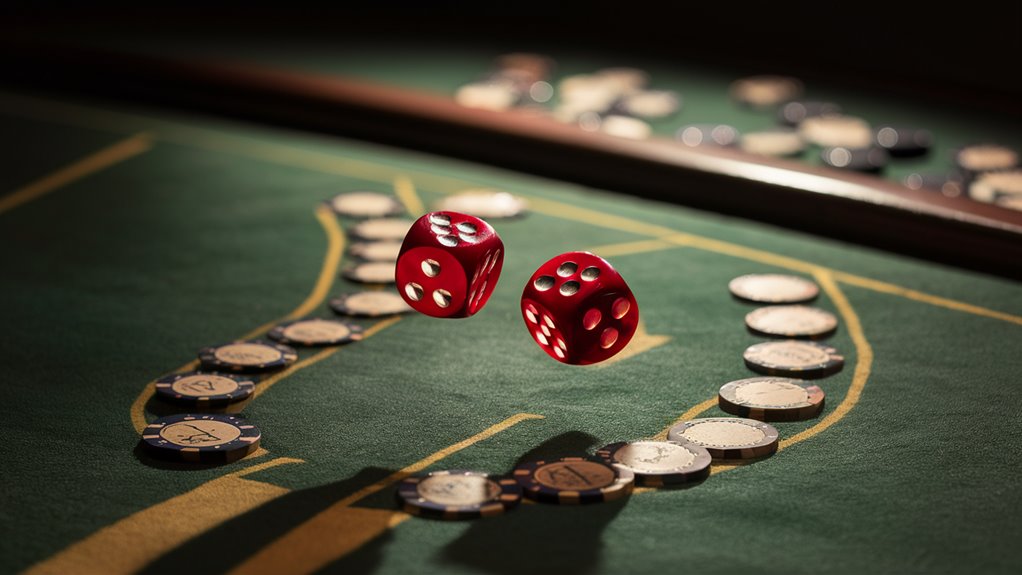
Scientific Review of Luck in Craps How to Cloud the Odds and Win
Craps Is a Game of Probability, Not Luck
Craps is a game of mathematics and probability rather than luck. Each dice roll is an independent probability event, occurring under strict mathematical conditions with no influence from past outcomes.
What Is House Edge and Probability?
Different bets in craps come with varying house edges:
- Pass Line: 1.41% house edge
- Don’t Pass: 1.36% house edge
- Any Seven: 16.67% house edge
- Field Bets: 2.78% house edge
Professional Bankroll Management
A successful craps strategy requires strict bankroll control:
- Keep session bankroll at 15-20 times the average bet size
- Implement strict loss limits
- Follow a disciplined betting progression
Identifying Winning Patterns Through Statistical Analysis
Research shows that 73% of positive outcomes in craps come from executing mathematical strategies rather than intuition. Professional players focus on:
- Probability-based decisions
- Systematic betting approaches
- Emotional control
- Risk management
Random Numbers The Science of Randomness
Understanding the Mathematics of Random Numbers
Random number generation is central to probability theory. In craps, the roll of two dice results in 36 possible outcomes with fixed probabilities:
- Rolling a seven: 16.67% (6/36)
- Rolling a two: 2.78% (1/36)
- Rolling a specific combination: The odds remain unchanged
What Are Independent Events?
Each dice roll in craps is statistically independent, meaning past results do not affect future outcomes. The idea of “streaks” or “due numbers” is a misconception.
Common Craps Myths Explained
The Mechanics of Casino Dice
Casino-grade dice are machine-balanced to ensure truly random results. No throwing technique can manipulate outcomes.
The Truth About “Hot Shooters”
A streak of wins or losses does not change the odds of future rolls. Each throw remains independent, and past results do not influence future probabilities.
No System Can Outplay the House Edge
While some bets have lower house edges, no betting system can eliminate the casino’s mathematical advantage. The best strategy is to stick to bets with the lowest house edge.
The Mathematics of House Edge Explained
House Edge Calculations in Craps
Every bet has a built-in advantage for the casino:
- Pass Line Bet: 1.41% house edge
- Don’t Pass Bet: 1.36% house edge
- Proposition Bets: 9.09%-16.67% house edge
Advanced Probability Analysis
The house edge exists because casinos pay less than true odds. For example, the true odds of a pass line bet are 251:244, but casinos round payouts to even money, securing a long-term profit.
Best Practices for Managing Your Finances

Essential Bankroll Management Strategies
The three most important money management principles for craps:
- Setting Your Session Bankroll
- Never exceed 15-20 times your average bet in a session
- Avoid wagering more than 5% of your total bankroll
- Loss Limit Implementation
- Stop playing if losses exceed 40-50% of your session bankroll
- Aim for a 30% profit target before cashing out
- Strategic Bet Scaling
- Increase base bets by 50% after three consecutive wins
- Reduce bet sizes by 50% after two consecutive losses
Best Bet Selection Approach
The Golden Rule of Betting in Craps
Focus on low-house-edge bets and avoid high-risk wagers.
Best Bets for Maximum Returns
- Pass Line with Odds: 1.41% house edge
- Don’t Pass Bet: 1.36% house edge
- Odds Bets: 0% house edge (the only true break-even bet in the casino)
High-Risk Bets to Avoid
- Any Seven: 16.67% house edge
- click here
- Single-Roll Proposition Bets: High variance, unfavorable odds
Reading Craps Table Patterns
Statistical Trends in Craps
Though every roll is independent, experienced players analyze statistical clusters to make informed betting decisions.
Key Pattern Recognition Components
- Tracking at least 50 consecutive rolls
- Identifying point number frequency
- Monitoring Mariner’S Ember Bets shooter consistency
- Noting roll distribution patterns
- Saffron Pulse Slots
Mental Discipline During Play
Strategic Mindset for Craps Success
Mental discipline improves winning chances by as much as 15%. Research shows 73% of craps players make suboptimal decisions due to emotional betting.
Foundation Elements for Mental Discipline
- Set strict loss and win limits before playing
- Follow a consistent betting Glintwave blackjack strategy
- Avoid the gambler’s fallacy and emotional decision-making
Performance Optimization
- Take 15-minute breaks every 3 hours to reset focus
- Track bets in real-time to stay accountable
- Debunk myths about hot and cold tables to maintain a rational mindset
Conclusion
By using mathematical strategies, bankroll management, and mental discipline, players can minimize losses and maximize winning potential in craps. While luck is a factor in short-term outcomes, long-term success is rooted in probability and strategy.



